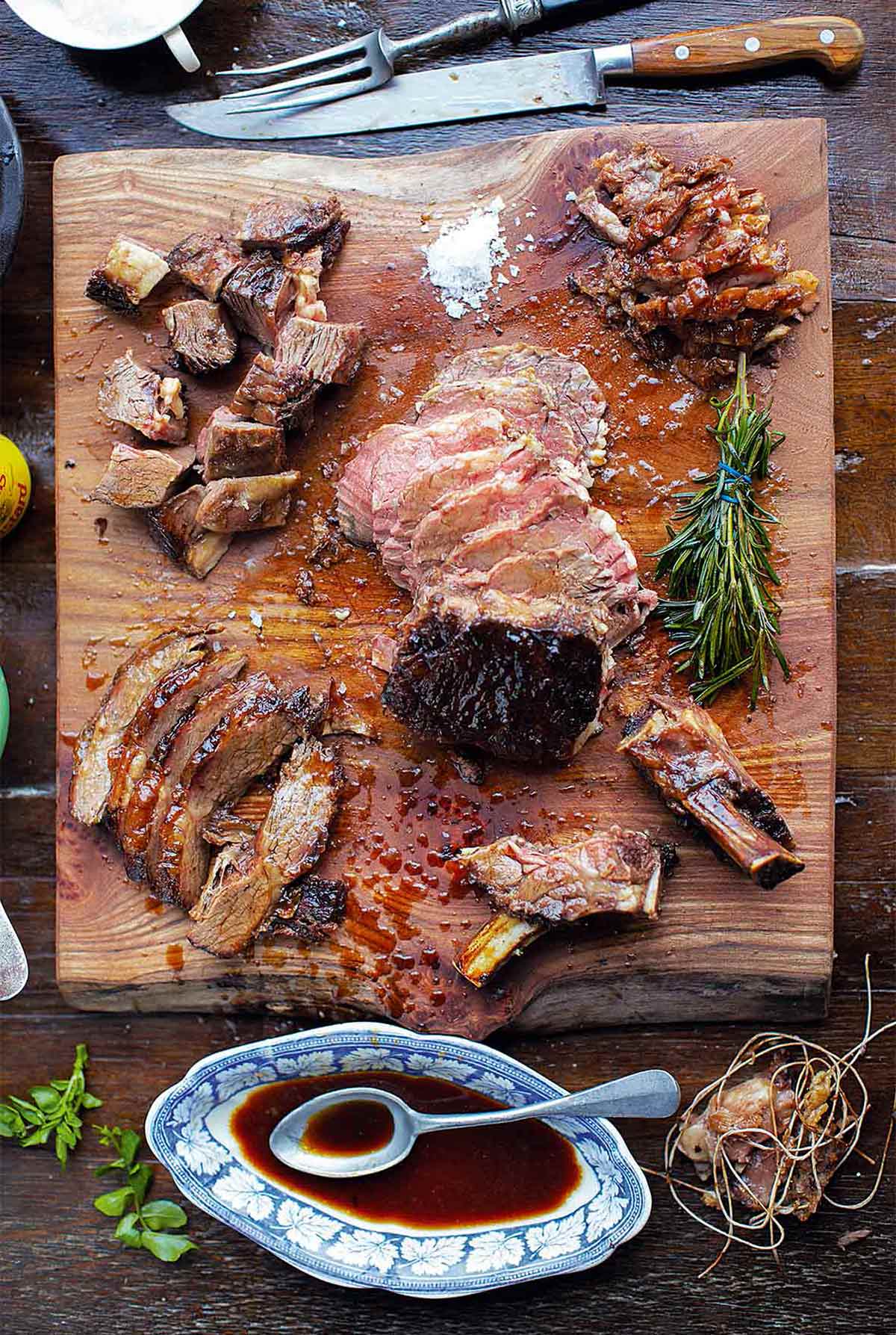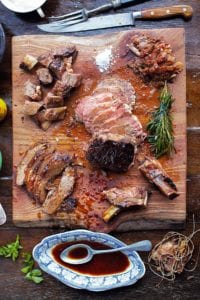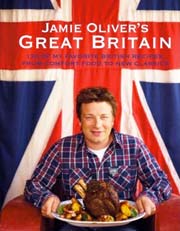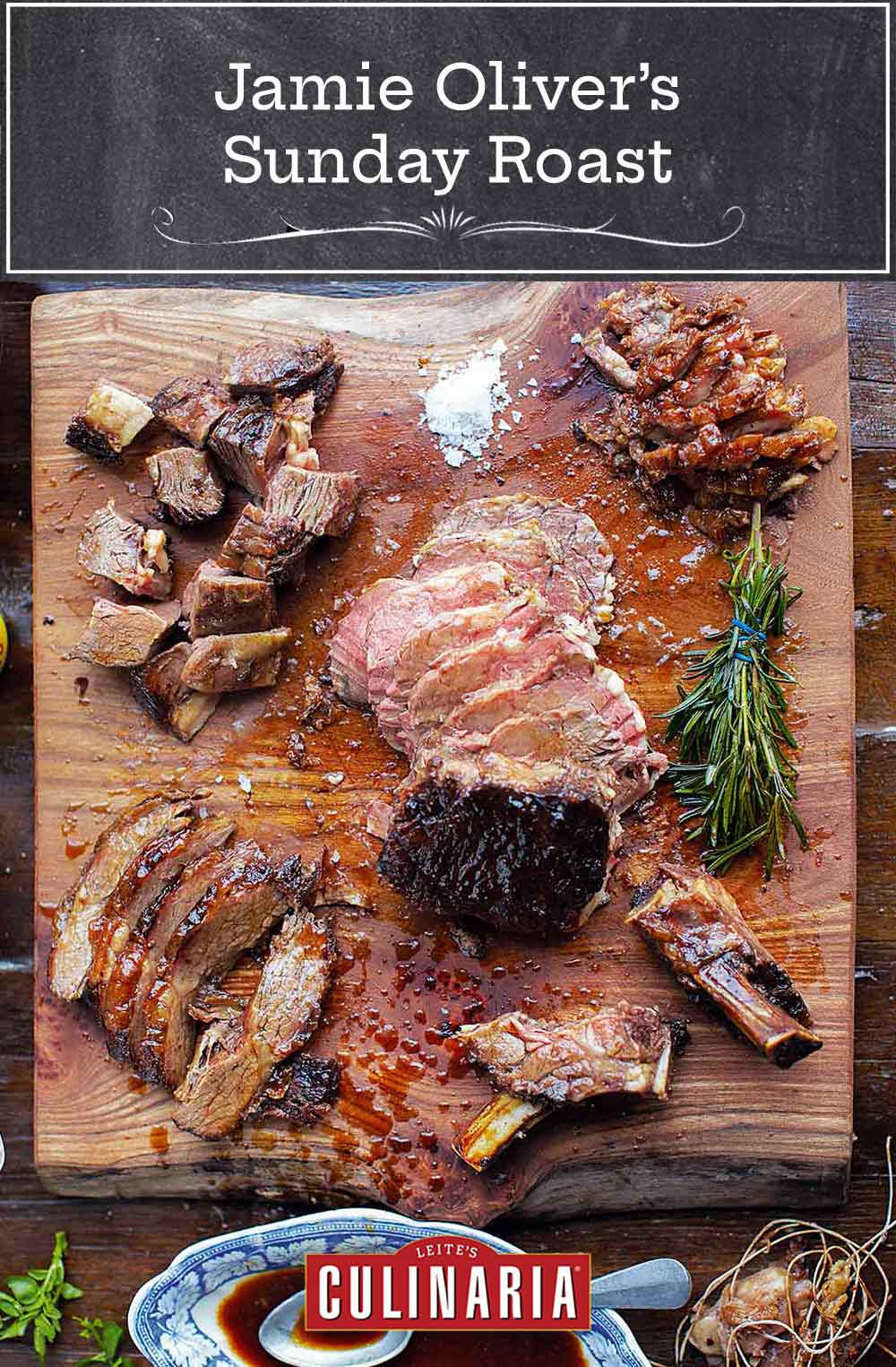
A Sunday roast, specifically Jamie Oliver’s Sunday roast, is truly something special. And although it’s certainly a splurge and worthy of a special occasion, it doesn’t necessarily merit a special occasion or holiday or other noteworthy event. Because what is life except a collection of moments? So we’re all about making as many of those moments as memorable as possible. This roast will help you do just that.–Renee Schettler Rossi
How to carve a rib roast
Rib roasts are commonly carved by slicing between the rib bones, yielding each diner a relatively ample steak that comprises four disparate parts: the medium-rare and meaty eye of the rib; the fatty, well-done, nicely marbled outer meaty portion; the oh-so-gnawable ends of the bones; and any crisp-edged fatty parts. And there’s nothing wrong with that. This recipe, though, takes a different tactic. It shows you how to read and carve a rib roast by hewing the entire roast into those same four different and distinct components and piling them all separately on the cutting board or the platter, enabling diners to indulge in just those parts that makes their knees most wobbly. Now that’s our kind of carving.

Jamie Oliver’s Sunday Roast
Ingredients
- One (5-pound) rib roast of beef, bone-in
- 1/2 bunch fresh rosemary, (about 5 sprigs)
- 1 heaping teaspoon sea salt, plus more to taste
- 1 heaping teaspoon white or black peppercorns
- Olive oil
- 2 1/2 pounds russet potatoes
- 1 pound turnips, (or substitute more potatoes)
- 3 1/2 tablespoons (1 1/2 oz) unsalted butter, at room temperature
- 2 tablespoons runny honey
- 1 whole head garlic, separated into cloves but not peeled
- 20 bay leaves, (yes, 20—although they could be optional)
- 6 tablespoons red wine vinegar or cider vinegar
- Prepared horseradish
- English mustard
Instructions
- Take the beef out of the fridge about 30 minutes before you intend to cook it.
- Preheat the oven to 475°F (246°C) and put your largest, sturdiest roasting pan in it to heat.
- Bash the leaves from 2 sprigs rosemary into a paste with a heaping teaspoon each of salt and peppercorns. Add a drizzle of olive oil and rub this paste all over the beef. Place the beef straight in the hot roasting pan, fatty side up, and roast it, uncovered, for 50 minutes if you want your roast rare to medium-rare, a little longer for medium. The temperature of the roast will continue to rise after you take it out of the oven and let it rest.
- Meanwhile, put a large pan of salted water on to boil. Peel the potatoes and turnips, then halve or quarter them and cut them into roughly 1-inch chunks. Add them to the boiling water, return to a boil, and then cook until somewhat tender, about 10 minutes. Drain the root vegetables in a colander and toss them a few times to expel any excess moisture, and then let them dry. (They can sit here for as long as needed.)
- Carefully transfer the roast to a plate and set the roasting pan aside. Leave the oven on. Dot half the butter (let’s just say 2 tablespoons although there's no need to be that precise) on top of the meat, then use the remaining rosemary sprigs to brush the honey all over the meat. Cover with a double layer of aluminum and a kitchen towel and let it rest for 30 minutes. Set the rosemary sprigs aside but don't discard them.
- While the meat rests, quickly bash the unpeeled cloves of garlic, then add them to the fat in the hot roasting pan along with the rest of the butter and the 20 bay leaves. Pour in the vinegar and place the pan over 1 or 2 burners turned to medium-high heat. Add the potatoes and turnips. Keep moving everything around and season well with salt and pepper. When everything is sizzling away, put the roasting pan with the vegetables back into the hot oven for 30 minutes, or until crisp and golden.
- When the vegetables are very nearly done, carve the beef. (If the meat was tied by your butcher, discard any string. Pour any juices that collected on the plate into a small heatproof dish and place it in the oven to keep warm. Grab a carving knife and first detach the roast from the bones in a single swoop by sliding the knife between the rib bones and the roast. Trim the upper cap, or fatty fat fat portion, of the roast and then trim and discard the visibly fatty portion of the cap (see bottom right portion of the photo) and thinly slice the remaining meaty section (see upper left portion of the photo). Slice the roast into chops by slicing between where the rib bones were (see center of the photo). Chop the meaty ends of the ribs (see upper right portion of the photo) from the rib bones (see bottom right).
☞ TESTER TIP: You may want to grab a couple of cutting boards—one to carve on, one to serve on.
- Use the rosemary sprig brushes from earlier to paint the various cuts of meat with the flavorful juices left on the cutting board. Serve the meat with the hot, crisp vegetables, the dish of hot juices, and a good schmear of horseradish and mustard.
Video

Nutrition
Nutrition information is automatically calculated, so should only be used as an approximation.
Recipe Testers’ Reviews
We loved this Sunday roast. Our palates—and our dog’s—were watering in anticipation. I have to admit to being confused as to how mashing rosemary leaves into a pulp would occur and if it was okay to leave the garlic peels on, but blind faith and the recipe did not fail me. The flavors were excellent.
Also, and this may have everything to do with the cut of meat, there wasn’t as much fat to cook the potatoes in as I expected, so I doused them with a little olive oil. We—that is, me and my tester-spouse—think that red or fingerling potatoes instead of turnips might be better.
I really liked this Sunday roast recipe. The meat was a lovely medium-rare and the vegetables were perfect!
It was fairly easy to put together. I bashed the leaves from 2 sprigs of rosemary into a paste with about a teaspoon of sea salt, a teaspoon of black peppercorns, and a tablespoon of olive oil, and then rubbed it on the roast before throwing it in the oven. I liked the pre-cooking of the potatoes and turnips, as the tossing in the colander broke up the sides a bit so when they baked they had lovely crisp bits. The only thing I didn’t like about this recipe was the addition of honey. I found that the sweetness didn’t go well with the beef—to my taste, anyway. Also, brushing the meat with the rosemary sprigs didn’t add any more rosemary flavor, so I’m sure you could just use a basting brush instead.
I’ve never made a prime rib before, but this was pretty spectacular. I didn’t realize I was actually making a prime rib (I’m new to cooking beef) until the butcher warned me that the roast was $19 a pound. Yikes! Well, we have some exciting things to celebrate in life these days, so I decided to go for it.
I had the meat in the oven for exactly 50 minutes and then rested it for about 45 minutes. The meat was very rare, so I popped it back into the oven at 425°F for another 10 minutes, which brought it up to medium-rare.
Overall, an excellent dish and I can’t wait for leftovers tomorrow on a sandwich!
This is a lovely Sunday evening meal that’s simple to make and provides a hearty start to the week ahead—plus a five-pound standing roast equals lots of leftovers for two people. The potatoes and turnips are a delicious accompaniment and soaked up all the flavors of the meat.
The recipe calls for 50 minutes to cook the roast, but it would be wise to check the temperature before pulling it. Nothing worse than letting a beautiful roast rest for 30 minutes only to find it’s raw in the middle. Other than that, the flavors, ease, and overall impressiveness of this recipe are quite wonderful.
I was thrilled when I cut into the roast and found it was still medium-rare on the inside (the outer edge that looked overcooked was very fatty, but the middle was perfect and juicy). The honey butter was so mild and may have mostly transferred flavor during the cutting process, either way, the tiny hint of sweetness was lovely. My veggies were crisp on the outside and soft on the inside — also perfect.
At the end of the 50 minutes of cooking time, I was pretty sure my roast was overcooked as we like our meat medium-rare. I was also unsure of the honey and butter on the beef but followed the instructions. By the time my vegetables were done, it was closer to 45 minutes since the roast came out of the oven. My only dislike with this recipe was that the meat was no longer hot so I wondered if some of the cooking of the vegetables and meat could be combined? Either way, a great recipe.
This is a great recipe! The family raved and raved. This is a simple preparation—but a really, really good one—that’s so typical of Jamie Oliver. I’d do this one again in a heartbeat.
I was surprised by the addition of honey and butter after the initial roasting, but loved the subtle difference in taste that they imparted. As for the roasted veggies, I didn’t have all of the ingredients specified, so I improvised with some beets and parsnips. It seems like a lot of garlic and bay leaves to use, but none of the flavors were overpowering. The smell of the vinegar cooking is very sharp, so I had to open a window. The end result was some of the nicest roast vegetables I’ve ever made.
There’s nothing quite like a rib roast on a Sunday afternoon, and this one is very unique. It’d never occurred to me to use honey on a roast, but with just a hint of rosemary and sweetness, the honey added a whole new dimension to the beef. The flavor was truly memorable. The turnips and potatoes are the perfect sidekick to this roast. I could not stop eating them, especially the potatoes.
I used 5 sprigs of rosemary total, and found that to be sufficient. While the roast is in the oven at the high heat, it does sizzle quite a bit. I just ignored the sound (since I did not see any flames), and let the roast, uh, roast. Have the vegetables prepared to cook before taking the meat out of the oven. This makes the whole process stress free.














This is the second time I made this recipe. My husband and kids loved it the first time. So I made it again. Cooked it alittle bit longer this time. Though I made different vegetables due to allergies.
Nice, Kathy! Thanks so much for taking the time to let us know.
Turned out fabulous! My sister and I made this recipe for my Dad’s 80th Birthday. Definitely needed a second hand as it’s a bit tricky. Everyone loved it, it was a complete success!
Great choice for a special birthday meal, Jamie! I’m so pleased that it was such a success.